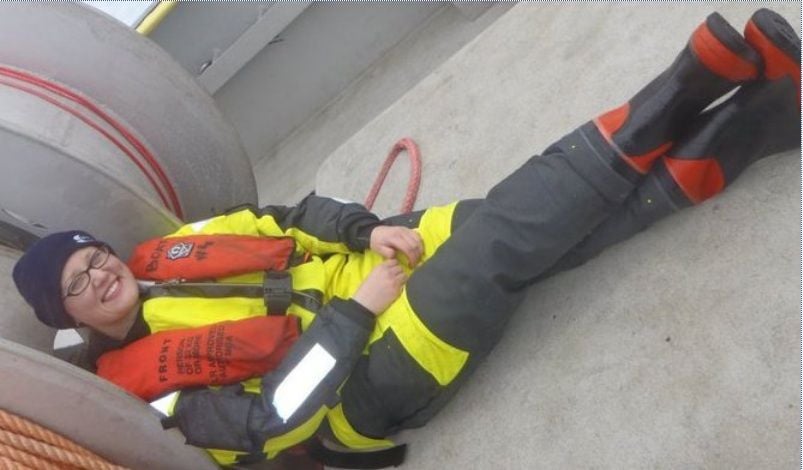Image Courtesy of the IMO #MaritimeWomenPhotoShare Campaign
If you’re someone who is working in a seafarer’s job, you don’t need us to tell you that life onboard can sometimes be stressful. Working on a vessel can come with its very own set of unique challenges.
But it’s how you deal with those challenges that can mean the difference between a successful career at sea and one that makes you wonder why you went to all the time and trouble of putting yourself through school and maritime training.
Simply put, you play a huge role in ensuring the globe's economy stays afloat. But the truth is, no job is easy—that's a given—but a special kind of challenge awaits those who choose life at sea.
Read more: 4 Wellness Tips for Officers of the Watch
Leading the life of a seafarer can be full of adventure, but even the most strong-willed can feel the stress. The vessel's rigorous schedule, which leaves little time for anything other than work can be to blame.
In this blog post we will take a look at some ways you can manage stress and any feelings of anxiety while you're working in a job at sea.
Some reasons you may be stressed when you work in a seafarer job
First of all, let’s take a quick look at some of the difficulties that you face as a seafarer on a container ship.
Due to the challenging work environment, as a seafarer, you are frequently exposed to various stresses. As a result, you face pressures that are mental, emotional, and physical in particular.

It’s important to understand the factors behind the stress so that you are better equipped to deal with it. We also have some blog posts relating to these particular issues, so carry on reading if you’d like to explore a particular area of concern.
Challenges faced by seafarers that can contribute to stress
- Spending time away from your loved ones - here are some tips on how to cope with working away from home
- A lack of social life or missing your buddies - here are some ideas for creating more of a community onboard
- Poor motivation which can lead to a lack of interest in your work - here’s how to maintain a sense of pride in your work as a seafarer
- Not being able to get a good night sleep onboard your ship - check out these tips for getting a good night sleep when you work in a seafarer job
- Feeling like you can’t communicate with your fellow crew due to cultural or language differences - we’ve got some ideas on how to communicate better when working at sea
If you’re struggling with any of the above issues while you’re working in a job at sea, keep on reading as we’ll explore some ways you can get a handle on your stress or anxiety.
And although no two humans are the same, knowing some of the most common reasons one gets stressed onboard is an excellent place to start.
Tips for dealing with stress in a career at sea
Start communicating more effectively
As we’ve covered briefly above, not being able to communicate with your fellow seafarers properly, due to cultural differences, different native tongues, or even clashing personalities can be the root of a lot of stress.

In seafarer jobs it is crucial that communication is effective for the safe operation of the vessel and her crew.
But communicating isn’t just about talking - it’s also about listening.
Listening to what is going on around you, listening to commands and instructions, listening to someone who is trying to communicate on a personal level to just have a chat - they’re all important. Especially if someone has a different style of communication to you, or an accent that you find a little tricky to understand.
Developing your listening skills will benefit you both professionally and personally. But how do you do that?
Be honest with yourself and think about how you listen to people. Take into consideration the following things:
- Do you finish other people’s sentences because you’re too impatient?
- Do you let someone finish what they’re saying? Or do you interrupt them?
- Do you make sure you’ve actually listened to and taken onboard any instructions or advice?
Not understanding what is going on, what you’ve been told, what you’re supposed to do next is stressful. But by taking a more considered approach to communication and listening properly you might just find that some of the stress is eliminated.
Read more: Two-Way Communication Tips for Seafarers & Their Families
Steer clear of negativity
Negativity is stressful. It’s not nice to be around people who are negative and it can take a fair bit of self restraint to not be affected by the emotions of others - especially if they’re complaining constantly.

Of course, serious issues should be addressed but if you’re finding yourself trapped in a cycle of negativity and you have one or two crewmates who you’ve realized are affecting your mood, you need to step away.
Don’t get sucked into complaining and moaning - even if it’s just to make conversation. Change the way you react and you should find your stress alleviating.
For example, if someone you work with is about to launch into another round of complaints while you’re stuck in the engine room, on deck or in the wheelhouse with them try:
- Telling yourself to focus on the positives - maybe the situation isn’t that great, but is there a silver lining to the cloud?
- Reminding yourself that this might be their issue and it doesn’t necessarily even affect you - so why get upset about it?
- Counteracting their complaints with a cheerful attitude of your own to try and lighten the mood - kill those negative vibes!
- If all else fails, and you are able to, walk away and go and find something else to do.
Read more: Jobs at Sea and How to Deal with a Negative Crewmate
Try not to get sucked into the daily grind
Easier said than done we know - after all, we all work, whether it’s ashore or a job at sea. But when you’re isolated on a vessel for months on end, it’s important to try and stay positive.

In any workplace, it can be so easy to fall into the trap of only ever talking about work as if it is the be all and end all. And especially when you’re onboard, it can be easy to lose sight of who or what is waiting for you at home and why you’re doing this job.
But endless talk of trying to line up your next job and employer, of working hard and waiting so long to move up the ranks, and even discussing salary, is only going to add to the stress.
So what can you do to lift yourself out of this black hole?
- Remember why you wanted to work in a seafarer job in the first place.
- Remind yourself of all the awesome benefits of maritime jobs: travel, sunsets, great friends!
- Step away from conversations that threaten to bring you down.
- Be glad that you don’t work in an office and appreciate your vessel!
How can you stay motivated when working at sea?
Eliminating stress is important, but what do you do when you're dealing with a lack of motivation? If you're exhibiting any of the telltale signs of demotivation, such as moving more slowly, putting off tasks, and lacking in energy you may need a motivation boost!
So, how can you bounce back and bring your best self to work each morning, shift or watch? Here are some things you can do to boost your motivation and productivity:
Make time to exercise
Seafarer jobs are structured and life at sea is based on a solid routine. When everyone works like parts of a well-oiled machine, deadlines and tasks are met with confidence and ease.

But for some, a strict routine can lead to monotony which can in turn causes mental exhaustion and breed boredom. After all, the human mind isn't a computer and we can't function like robots running on the same software every day without becoming demotivated.
To break the day-to-day routine, find time to exercise every day. It helps you look forward to doing something else other than work.
Scheduling time for exercise can occasionally provide the much-needed break needed to let off steam built up from a particularly challenging shift.
Many studies have demonstrated that exercise, in general, can enhance mood and lessen stress and anxiety.
Physical activity encourages the synthesis of the chemicals serotonin and norepinephrine, which lessen depressive symptoms. It also boosts endorphin production, which helps us feel good and motivates us.
Unplug yourself
The Internet is a double-edged sword. On the one hand, it helps you stay connected with the world. Through it, you can contact your family and friends back home.

On the other hand, it can be the source of negativity and jealousy. Social media has this particular effect that makes us want to compare ourselves and our lives with those of others.
But the thing is, many people showcase a edited or filtered life online. So, for your peace of mind, try to unplug once in a while.
Stay offline for some time and distract yourself with activities that require you to live in the moment.
You can read books. Listen (and even dance!) to your favorite music. Try to start a journal and record your thoughts and feelings for the day. Even cleaning your cabin can even help lift your spirits.
A few more tips for staying happy and stress-free onboard
There is no magic cure for eliminating stress but there are definitely things you can do on a day to day basis to boost your mental health as a seafarer. For example:
- Focus on what makes you happy onboard.
- Be the best crewmate you can be and spread positivity around.
- Invest your free time in your future by training, learning and educating yourself.
- Stay physically active - it’s well known this helps mental wellbeing.
- Don’t forget to de-stress when you get home too.
How can crew working on a ship cultivate a stress-free environment?
The thing about cultivating a stress-free environment is that you need to get everyone on board. Literally and figuratively.
After work, try to avoid locking yourself inside your cabin. Make it a point to mingle and interact with others. The longer you spend alone, the more lonely you can become. A great way to make your life at sea happier is to be friendly and have people talk or hang out with you.

On that note, having a party can work wonders when it comes to lifting the spirits of the crew.
No parties planned? Whether it’s a someone's birthday or a just-because-we-can barbecue, why not be the one to arrange a knees-up?! These events and celebrations encourage you to form ties with your fellow crew members and keep you emotionally engaged during your time working at sea.
How to deal with stress in seafarer jobs: conclusion
Many jobs are stressful. Seafarer jobs in particular come with added responsibilities and baggage. If you’re thinking about starting a career at sea, there are definitely some questions you should ask yourself first to make sure it’s the right fit for you.
And if you’re already working in a job at sea and are feeling stressed, we hope some of our tips in this blog post will help you.
To sum it up, the key for a successful career at sea? A healthy body and mind. Cultivate your hobbies, build a solid bond with your crewmates, and enjoy what every day brings. You’re one of the few lucky ones who get to see and experience the beauty life at he sea has to offer.
Thank you, seafarers, for helping to keep the world turning.
If you’re ready to start or continue working on ships, Martide can help get you started. Build your resume today or view our seafarer job vacancies now.
And don’t forget to download our seafarer job app for iOS or Android from the Apple App Store or from Google Play either!
This blog post was first published on November 22nd 2023 and updated on September 12th 2023.

Eve Church
Eve is Martide's content writer, publishing regular posts on everything from our maritime recruitment and crew planning software to life at sea. Eve has been writing professionally for more than two decades, crafting everything from SEO-focused blog posts and website landing pages to magazine articles and corporate whitepapers.
UK

is the only site for maritime jobs




